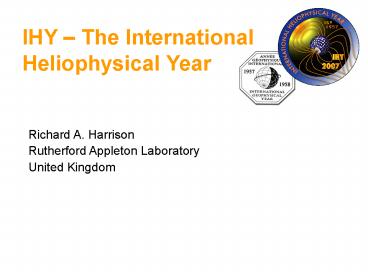Richard A. Harrison - PowerPoint PPT Presentation
Title:
Richard A. Harrison
Description:
Richard A. Harrison. Rutherford Appleton Laboratory. United Kingdom ... January 1875 at the Academy of Sciences in Vienna Carl Weyprecht suggested a ... – PowerPoint PPT presentation
Number of Views:24
Avg rating:3.0/5.0
Title: Richard A. Harrison
1
IHY The International Heliophysical Year
Richard A. Harrison Rutherford Appleton
Laboratory United Kingdom
2
Historical Perspective
- First International Polar Year
- January 1875 at the Academy of Sciences in
Vienna Carl Weyprecht
suggested a
coordinated study of the north
polar region - Polar meteorological and magnetic observations
commenced on Aug 1, 1882 and concluded
Sep 1, 1883 - Second International Polar Year
- Scientific activities were significantly limited
by the world-wide economic depression - Polar meteorological and magnetic observations to
be made in 1932-1933, fifty years after the first
IPY
- International Geophysical Year
- In 1957 the IGY involved about 60,000 scientists
from 66 nations - To obtain simultaneous, global observations on
Earth and in space
The logical next step is to extend global studies
into the Heliosphere to incorporate the drivers
of Geophysical change into the global system-The
IHY.
3
Historical Perspective
The IHY continues the tradition of previous
international years through synoptic observation
of universal physical processes in the solar
system.
4
IHY - The Story So Far
- Plans for IHY have been under discussion
since 2001, with
early sessions at the 2002
World Space Congress in
Houston, the
2003/4 EGU meetings in Nice and
local
meetings in the USA and UK. - The international IHY committee is led by Joe
Davila (NASA/GSFC). - IHY is endorsed by COSPAR, AGU, IAU, UN OOSA,
NASA, IUGG, SCOSTEP etc - IHY is accepted as a project within the IPY,
selected in collaboration with ICESTAR as a lead
project with a coordination role in a number of
campaigns. - IHY has been adopted by the UN Office for Outer
Space Affairs as the theme for a series of
workshops on Basic Space
Science (www.oosa.unvienna.org)
5
Science Goals
1. Develop the basic science of heliophysics
through
cross-disciplinary studies of
universal processes. 2. Determine
the response of terrestrial and
planetary magnetospheres and
atmospheres to external drivers. 3. Promote
research on the Sun-heliosphere system outward to
the local interstellar medium - the new
frontier. 4. Foster international scientific
cooperation in the study of heliophysical
phenomena now and in the future 5. Communicate
unique IHY results to the scientific community
and the general public
6
Why Now?
Fifty years after the IGY, a large armada of
existing or planned spacecraft are in place to
provide the most comprehensive global
measurements of the Sun-earth interplanetary
system yet obtained Earth based observatories can
provide measurements of terrestrial effects at
the poles and elsewhere
International collaboration is easier today than
in previous international years with abundant and
cheap electronic communication available
NOW is the best opportunity for global studies
in the next 50 years
7
More red tape?
- Most international activities of this kind create
many meetings
and extra paperwork/e-mails
yet the product is questionable.
Why is IHY
different? - IHY is NOT designed to be another red-tape
activity. It is set up as an enabling activity
for the grass-roots scientist to drive
co-ordinated observations and to encourage
international collaborations and outreach. - The IHY Web site is at ihy2007.org. The official
European IHY Web site is at www.lesia.obspm.fr/IHY
/ the UK site is at ihy2007.org.uk. - In practice, IHY is what you make of it!
8
More red tape?
- So what does it do for me?
- Enables campaigns/access to
instruments/data Mainly through
the COORDINATED
INVESTIGATION PROGRAMMES (CIPs) - Coordinates meetings to encourage collaboration
(e.g. UN meetings in developing countries), in
particular with developing countries. - Acts as focus for information dissemination,
operations planning, outreach etc, etc
9
Planning Organization
10
Program Elements
Science campaigns (CIPs) Distributed small
instrument arrays Magnetometers, radio dish, GPS
receivers, all-sky cameras, etc. Series of
cross-cutting CDAW-like workshops to develop
interpretations Publication of workshop results
Outreach, Education, and History History
preservation effort in conjunction with AGU
History Committee IGY Gold Program to honor
participants in the IGY Educational
outreach Planetarium show development UNBSS
distributed instrument initiative
11
UN Basic Space Science Workshops
To Encourage Basic Space Science in Developing
Countries
- UN Basic Science Workshops established in 1991.
- IHY adopted as theme from 2004.
- First dedicated workshop in United Arab
Emirates, 20-23 November 2005. - Fostering international coordination and
communication. - Major effort to define and deploy
instrumentation in the developing nations.
12
The Co-ordinated Investigation
Programmes (CIPs)
THE SOHO JOINT OBSERVING PROGRAMMES (JOPs) AS A
MODEL FOR THE PRACTICAL IMPLEMENTATION OF THE IHY
13
The Co-ordinated Investigation
Programmes (CIPs)
- Most basic, lowest-level building block of any
campaign is the set of observations required by
a single scientist or collaboration to satisfy a
specific scientific question. - With the CIP concept, the IHY scientific
campaign is the sum of the CIPs i.e. it is user
driven.
14
Major Meetings
2006 January 10-13 Paris, France. IHY
European General Assembly 2007
February 5-9 Helsinki, Finland.
ICESTAR/IHY Kick-off meeting 2007
February 19-20 Vienna, Austria. Formal IHY
kick-off meeting 2007 June 18-22 Torino,
Italy. 2nd IHY European General Assembly
For full list, see http//ihy2007.org
15
Overall Schedule
2004 Regional coordination meetings,
campaigns begin to be
defined,
synergy/coordination discussions with
professional organizations
2005 Synthesis from regional to international,
merging of science working groups and campaigns,
"backfilling" missing initiatives 2006
Prototyping year, preliminary work, review and
finalize campaign proposals, proposals to
national funding agencies 2007 IHY campaigns,
establish data bases and tools 2008 workshops,
publications, archives
WEBSITE http//ihy2007.org































